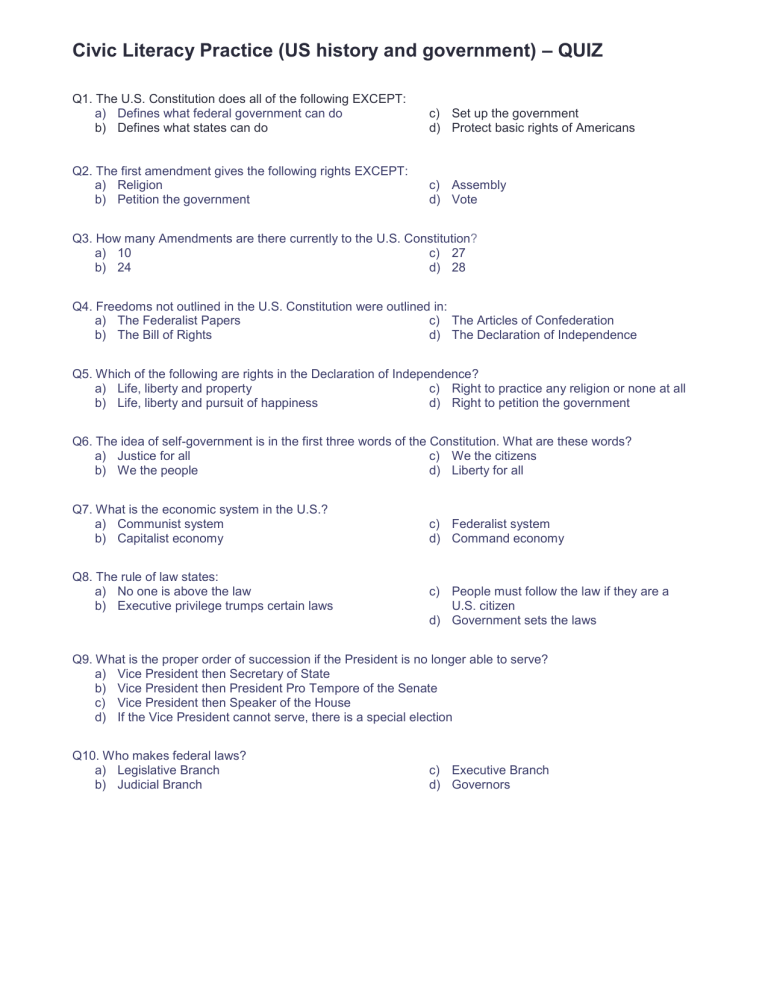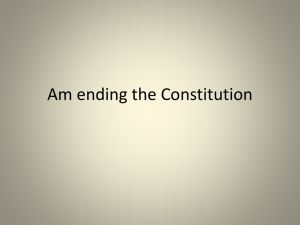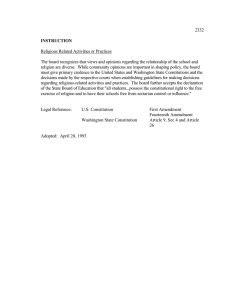
Civic Literacy Practice (US history and government) – QUIZ Q1. The U.S. Constitution does all of the following EXCEPT: a) Defines what federal government can do b) Defines what states can do c) Set up the government d) Protect basic rights of Americans Q2. The first amendment gives the following rights EXCEPT: a) Religion b) Petition the government c) Assembly d) Vote Q3. How many Amendments are there currently to the U.S. Constitution? a) 10 c) 27 b) 24 d) 28 Q4. Freedoms not outlined in the U.S. Constitution were outlined in: a) The Federalist Papers c) The Articles of Confederation b) The Bill of Rights d) The Declaration of Independence Q5. Which of the following are rights in the Declaration of Independence? a) Life, liberty and property c) Right to practice any religion or none at all b) Life, liberty and pursuit of happiness d) Right to petition the government Q6. The idea of self-government is in the first three words of the Constitution. What are these words? a) Justice for all c) We the citizens b) We the people d) Liberty for all Q7. What is the economic system in the U.S.? a) Communist system b) Capitalist economy Q8. The rule of law states: a) No one is above the law b) Executive privilege trumps certain laws c) Federalist system d) Command economy c) People must follow the law if they are a U.S. citizen d) Government sets the laws Q9. What is the proper order of succession if the President is no longer able to serve? a) Vice President then Secretary of State b) Vice President then President Pro Tempore of the Senate c) Vice President then Speaker of the House d) If the Vice President cannot serve, there is a special election Q10. Who makes federal laws? a) Legislative Branch b) Judicial Branch c) Executive Branch d) Governors Q11. We elect a U.S. Senator for how many years? a) 2 b) 4 c) 6 d) 8 Q12. There are how many voting members in the U.S. House of Representatives a) 100 c) 435 b) 430 d) 450 Q13. Who is Commander in Chief of the military? a) President b) Vice President c) President of the Senate d) Secretary of Defense Q14. Who is the current Chief Justice of the U.S. Supreme Court? a) John Roberts Jr. c) Ruth Bader Ginsburg b) Brett Kavanaugh d) Clarence Thomas Q15. Which of the following is NOT a power of the states a) To provide education b) To provide protection and safety c) To determine driving license regulations d) To print money Q16. All of the following are powers of the federal government EXCEPT a) To declare war c) To create an army b) To approve zoning and land use d) To print money Q17. Each of the following amendments to the U.S. Constitution deal with who can vote EXCEPT: a) 13th Amendment c) 19th Amendment b) 15th Amendment d) 26th Amendment Q18. The principle of American government that establishes concurrent state and national governments is known as: a) Separation of powers c) Federalism b) Limited government d) Checks and balances Q19. The Fifth Amendment protects citizens from all of the following EXCEPT: a) Being tried twice for the same offense (double jeopardy) b) Being tried for a capital crime c) Serving as a witness against themselves (self-incrimination) d) Being deprived due process of law Q20. Which of the following are rights for anyone living in the U.S. regardless of citizenship? a) Vote in a federal election c) Run for federal office b) Serve on a jury d) Petition the government Q21. What steps are taken to ratify an amendment? a) It must be proposed by two-thirds of both Houses or by two-thirds of the states, and then ratified by three-fourths of the states b) It must be ratified by two-thirds of both Houses or by two-thirds of the states, and then ratified by the President c) It must be proposed by the President and ratified by all 50 states d) It must be proposed by the Supreme Court, and then ratified by two-thirds of Congress Q22. All of the following are ways that Americans can participate in their democracy EXCEPT: a) Join a political party b) Give an elected official your opinion on an issue c) Vote d) Volunteer to help the needy in your community Q23. The colonists fought the British for all of the following reasons EXCEPT: a) Land ownership disputes c) Quartering b) Taxation without representation d) Wanted self-government Q24. All of the following were original colonies EXCEPT: a) Massachusetts b) Connecticut c) Virginia d) Vermont Q25. The Federalist Papers were written by the following authors EXCEPT: a) Thomas Jefferson c) Alexander Hamilton b) James Madison d) John Jay Q26. Benjamin Franklin is known for the following EXCEPT: a) First Postmaster General of the U.S. b) Started the first free libraries c) First Secretary of State d) Served as a U.S. diplomat Q27. All of the following were reasons that led to the Civil War EXCEPT: a) States’ rights b) Taxation without representation c) Economic reasons d) Slavery Q28. Susan B. Anthony is best known for: a) Fighting for women’s rights b) Creating the first U.S. flag c) Serving as the first female U.S. Senator d) Helping wounded soldiers in World War I Q29. Who was President during World War I? a) William Taft b) Woodrow Wilson c) Theodore Roosevelt d) Franklin D. Roosevelt Q30. During the Cold War, what was the main concern of the U.S.? a) Communism b) Global Warming c) Crop failures and famine d) Nazism Q31. What part of the Constitution protects the freedom of religion? e) The Preamble f) The Bill of Rights g) Article I h) Article II Discussion questions/Open Ended (US History and Government) Why does the Constitution require bills be introduced in the House of Representatives? Why does the Constitution require bills be passed by one branch and signed by another? Why does the Constitution require that one branch nominate a Supreme Court justice and a second branch confirm it? How many Senators are from each state and how long is their term and why? How many Congress members are from each state and how long is their term and why? What rights are reserved for U.S. citizens only? What are ways that citizens can get involved with government? What are powers reserved to the states? What documents supported the Declaration of Independence? Ratification of Constitution? Explain the Equal Protection Clause. What is the meaning of “consent of the governed”? Which area of our government demonstrates this? What is eminent domain? What is the “necessary and proper clause”? What is the Supremacy Clause? What is the Free Exercise Clause? What is the Rule of Law? What is Federalism? What is one shared power between federal and state governments? Declaration of Independence: Why? When signed? First two paragraphs? What language do you know from it? Constitution: Why? When signed? What is it considered? What does it contain? What language do you know from it? Articles of Confederation: What was it? Why was it eliminated? LEGAL: Which cases reinforced power of courts/judicial review? Which case protected federal government rights without interference by a state (implied powers)? Which cases focused on rights of school students? Which cases focused on rights of equal protection? Which cases focused on First Amendment rights? Which case focused on Second Amendment rights? Which cases focused on Fourth Amendment rights against illegal search/seizure? Which cases focused on Sixth Amendment right (to attorney)? Which case focused on interstate trade?





